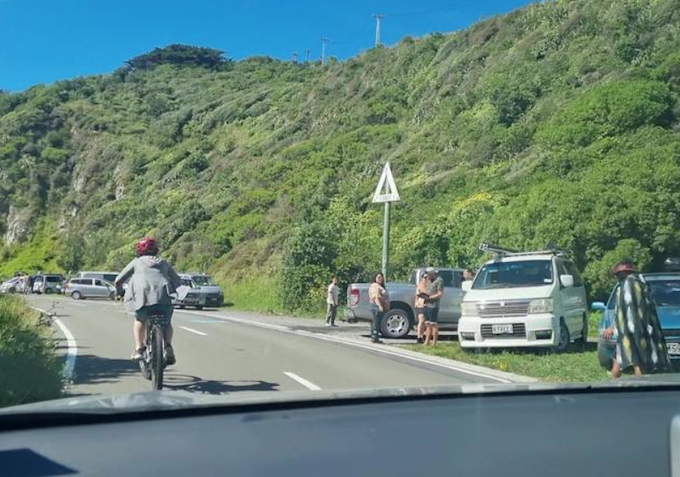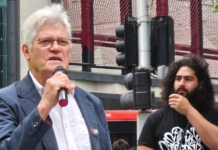
Small groups of anti-mandate protesters are still lingering around Wellington after being cleared out of New Zealand’s Parliament precinct on Wednesday
The disparate collection of groups and individuals who took part in the protests are divided about what happens next.
Police say go home, and some protest groups like Voices for Freedom have told their followers the same thing.
- LISTEN TO RNZ FIRST UP: ‘Pack up and go home’ — Wellington deputy mayor Sarah Free
- READ MORE: Political parties condemn Parliament protesters, praise police actions
- Parliament protest aftermath – NZ police enter ‘significant investigation phase’
- Police out in force after chaotic scenes end anti-mandate protest at NZ’s Parliament
- Covid-19 update: 22,527 new community cases, 562 in hospital – five deaths
- NZ Parliament grounds ‘reclaimed’: Police operation ends 23-day protest
- Other NZ covid outbreak reports
However, about 30 to 50 vehicles were parked at Mahanga Bay on the Miramar Peninsula, and protesters there told RNZ reporters they planned to stay in Wellington “as long as it took”, though they were not sure what that might mean.
Several Wellingtonians told RNZ they were out this morning to keep an eye on the protest groups, and wanted them to leave.
Police say they will maintain a heavy presence at Parliament grounds, which is cordoned off and being treated as a crime scene.
About 20 minutes away from Parliament in eastern Lower Hutt about 100 protesters were in the suburb of Wainuiomata, gathered at a private property.
Attempt to gather at Wainuiōmata Marae
They had initially tried to gather at Wainuiōmata Marae, but a group of locals organised by the iwi headed them off at the gate saying: kahore he ara — there is no way, and calling for them to move on and go home.
Manager Teresa Olsen runs a busy covid-19 vaccination centre at the Wainuiōmata Marae, and said some of the anti-vax protesters had tried to get onto the grounds and were abusive to the iwi group at the gate.
“We’ve had a lot of the protesters go by,” she said.
“Everybody has the right to decide what they will do, and we have decided to be vaccinated, and we want the protesters to respect our right to do that.”
She said a group of iwi supporters would stay at the marae overnight to protect it.
Wellington deputy mayor Sarah Free told RNZ First Up she had also seen groups camped on the Miramar Peninsula.
“There are a few smaller groups of what looked like protesters — although they’re not protesting, they’re just there.
“We’re … hoping they’re going home quite soon. They’ve made their point, they’ve caused a lot of upset and some damage and the best thing they can do now is pack up and go home. I think it’s time to move on.”
To those protestors who attempted a takeover of Wainuiomata Marae? Go home you backdoor bandits! #endtheprotest
— Matthew Tukaki (@tukakimatt) March 3, 2022
Cost of protest damage not yet clear
It is unclear what the council’s final bill will be as the clean up around Parliament continues.
The protesters occupied Parliament’s grounds and surrounding streets for 23 days and their rubbish and damage is now being cleaned up.
Deputy Mayor Free said the cost would be made public when the total was known.

But while there was a list of things to get through like repairing the pavements, street furniture and lighting — there were other costs to consider such as business and consumer confidence in the area.
“I think Wellingtonians love their city … we’ve been blown away by the numbers of Wellingtonians who’ve actually wanted to help with the clean-up,” Free said.
“We are proud of our city, the work and the focus now is on restoring the damage, getting the mana of Parliament back and just keeping our city something we can all be proud of.
“But … there’s the damage done to businesses and to people’s confidence, and that’s what we’re really focused on restoring — we’re focused now on getting Wellington back to the place we know and love, and that can’t just be measured in dollars.”
This article is republished under a community partnership agreement with RNZ.











































